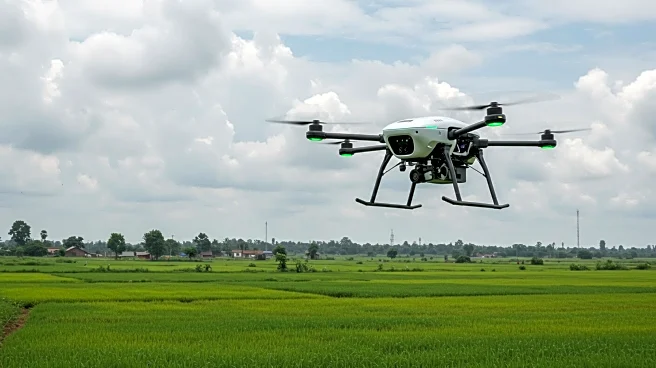What's Happening?
Degas Limited has announced a significant investment of $100 million over the next four years to establish Ghana as Africa's first AI-powered agricultural hub. This initiative aims to expand a model that has already supported over 86,000 smallholder farmers across 122,000 acres in Ghana. The investment will focus on scaling AI-driven satellite monitoring and precision agriculture techniques to enhance yields, reduce risks, and provide access to fair financing for farmers. The CEO and founder of Degas Limited, Doga Makiura, highlighted the success of their model, which has doubled farmer incomes with a 95% repayment rate. The announcement was made during a meeting with President John Dramani Mahama at the Ghana Presidential Investment Forum, where the initiative was praised for its potential to transform Ghana's agricultural sector.
Why It's Important?
This investment is crucial for Ghana's agricultural sector as it promises to enhance productivity, improve food security, and create jobs, particularly for the youth in rural communities. By leveraging AI and precision technologies, the initiative aims to integrate agricultural value chains, connecting farmers to markets, finance, storage, and processing. The involvement of Japanese investors underscores the international confidence in Ghana's approach to agricultural development. This move aligns with President Mahama's focus on value-chain integration, which is expected to attract further international partnerships and investments, thereby boosting the country's economy and agricultural capabilities.
What's Next?
The funding will support the expansion of Degas' farmer financing, satellite-enabled crop monitoring, and precision agronomy services. It will also deepen partnerships across input supply, logistics, and offtake to strengthen local value chains. As the initiative progresses, it is likely to attract more international interest and investment, potentially setting a precedent for similar projects across Africa. The success of this initiative could lead to increased adoption of AI technologies in agriculture, further transforming the sector and improving the livelihoods of smallholder farmers.
Beyond the Headlines
The ethical implications of using AI in agriculture include concerns about data privacy and the potential displacement of traditional farming practices. However, the integration of technology in agriculture also presents opportunities for sustainable farming practices and improved resource management. The long-term impact of this initiative could lead to a shift in how agriculture is perceived and practiced in Africa, potentially influencing policy decisions and educational programs focused on technology-driven agriculture.










